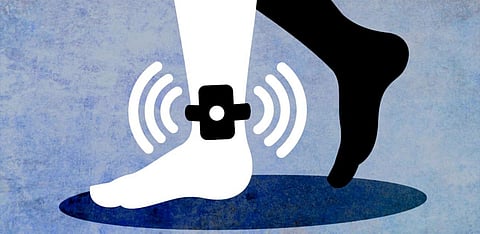

The use of a GPS tracker on an undertrial prisoner is a direct contravention of the right to privacy as it allows the Big Brother to always monitor the location and activity of an undertrial prisoner, writes Hamzah Patel.
—
WHILE the stated philosophy of the criminal justice system in India is 'bail is a rule, jail is an exception', an attempt has been made to make the whole world a jail for an undertrial prisoner while completely disregarding rights, constitutionality and basic humanity.
This is in reference to the Jammu and Kashmir (J&K) police becoming the first department in India to use GPS tracker anklets on Ghulam Mohammad Bhat, a close associate of Syed Ali Shah Geelani, the doyen of pro-plebiscite and pro-accession-with-Pakistan politics in the state.
This abhorrent activity has far-reaching consequences once we factor in the political conditions of Kashmir.
As observed in the European Convention of Human Rights and further upheld in the K.S. Puttaswamy and Anr. versus Union of India & Ors, the right to privacy is a fundamental right guaranteed by the Constitution of India under Articles 19 and 21.
The use of a GPS tracker on an undertrial prisoner is a direct contravention of the right to privacy as it allows the Big Brother to always monitor the location and activity of an undertrial prisoner.
“The use of a GPS tracker on an undertrial prisoner is a direct contravention of the right to privacy as it allows the Big Brother to always monitor the location and activity of an undertrial prisoner.
It is further also in contravention of the basic tenets of the idea of bail itself. Bail, under the Criminal Procedure Code, 1973, is provided to guarantee freedom and liberty to an undertrial prisoner owing to the principle, 'innocent until proven guilty'.
If an undertrial prisoner is always under the watch of the State, then the very purpose of bail is defeated.
Similar instances can be observed in countries such as China where Uyghur Muslims are facially profiled in order to monitor their activities. There was widespread condemnation of the US owing to the use of GPS trackers on immigrants who were on immigration bail.
Furthermore, In Neelabati Bahera versus State of Orissa, the Supreme Court has remarked that: "There is a great responsibility on the police or prison authorities to ensure that a citizen in their custody is not deprived of his right to life. His liberty is in the very nature of things circumscribed by the very fact of his confinement and therefore his interest in the limited liberty left to him is rather precious."
But now, because of these GPS tracking systems, the prisoners will be illusioned of having liberty while truly they are left with none of it. One of the important tenets that should not be forgotten here is that the right to privacy encompasses not just autonomy but also anonymity both in the personal and public domain.
Such surveillance measures are in violation of not just the Puttaswamy judgment but also of the doctrines of the Indian Constitution and the framework of personal autonomy it has set for citizens.
More often than not, the process of bail in India is draconian; owing to the lack of courage of judges, bail hearings metamorphosise into bail trials where the prisoner gets no remedy and bail, which is supposed to be a norm, gets delayed and ends up becoming an exception. For example, Umar Khalid has been in jail for more than 1,000 days despite innumerable bail hearings.
The government has backed itself by claiming that the implementation of GPS trackers on prisoners as a measure will alleviate the strain on India's consistently overcrowded prisons. However, this seems an unreasonable recourse to a perennial problem.
Furthermore, as per the National Crime Records Bureau, Indian prisons currently house 554,034 inmates— 76 percent of them awaiting trial. While in J&K, where a crackdown on human rights activists has led to numerous arrests, the percentage of prisoners awaiting trial is even higher at 91 percent.
A certain skepticism is inevitable when viewing the government's policies as when a Bench of the Supreme Court Justices S.K. Kaul and M.M. Sundresh proposed the implementation of a comprehensive bail law in India to address the growing backlog of bail applications, no actions were taken on the same.
The Supreme Court established the Committee on Prison Reforms in 2018, led by former Supreme Court judge Justice Amitava Roy. Despite several extensions, the committee has been inconclusive due to bureaucratic resistance.
These inactions reek of despotism. Add to them the action of the government to curb prisoners' rights, such as passing guidelines in 2015 limiting media's access to prisons.
“These restrictions only serve to control the narrative on prisons and prisoners further, hinder transparency, and undermine the democratic principles of free expression and scrutiny of public institutions, particularly regarding prison conditions.
This Order imposes stringent requirements for prison access, demanding a significant security deposit, limiting movement within the facility, and necessitating government approval for any resulting publications.
These restrictions only serve to control the narrative on prisons and prisoners further, hinder transparency, and undermine the democratic principles of free expression and scrutiny of public institutions, particularly regarding prison conditions.
Moreover, the introduction of statutes such as the Criminal Procedure (Identification) Rules, 2022 by the present government (wherein they can collect data including a prisoners' finger impressions, iris and retina information) shows the disregard the present government has for constitutional morals such as rights against self-incrimination.
When all the aforementioned things are considered collectively, it is clear that prisoners' welfare and liberty are not the most valued virtues of the government.